Faculty Activities
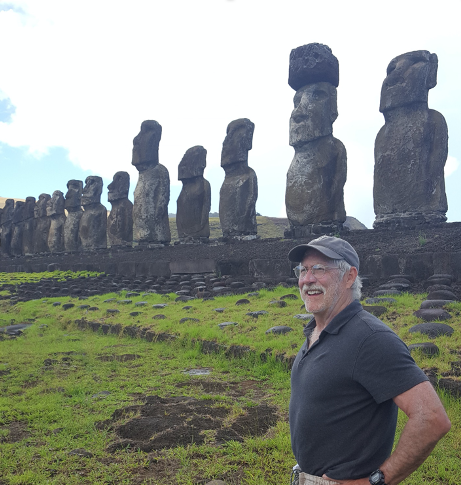
Dr. Terry Jones in Easter Island
Dr. Terry Jones returned to the department as a full-time faculty member in Fall 2019 after 12 years as chair. In winter quarter he took sabbatical during which he completed a book, The Prehistory of Morro Bay, Central California’s Overlooked Estuary (co-written with his wife, Deborah A., Jones, former student, Kacey Hadick, William R. Hildebrandt, and Patricia Mikkelsen, University of Utah Press), and an edited volume, Cowboy Ecologist: Papers in Honor of Robert L. Bettinger, (co-edited with former student, Roshanne Bakhtiary and Michael Delacorte, Center for Archaeological Research at Davis).

Dr. Terry Jones with his new
friend, an unmanned aerial vehicle
(drone), on Easter Island.
In February Dr. Jones traveled to Rapa Nui where he worked again with Kacey Hadick whose company, Cyark, is collaborating with the Chilean government and indigenous Rapanuians to document some of the island’s famous statues that have been impacted by sea level rise and coastal erosion. Terry had plans to deliver two papers at the Society for California Archaeology annual meeting in the spring, but they were thwarted by the Covid 19 pandemic. In June Dr. Jones entered the Faculty Early Retirement Program, but he will continue to teach prehistory and archaeology classes for the department for the next five years.
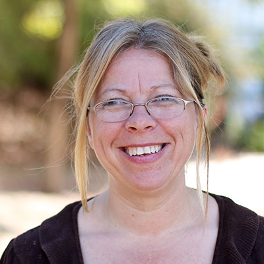
Dr. Stacey Rucas
Dr. Stacey Rucas convened a new student research group to investigate how locus of control may be affected by the current Covid-19 pandemic in the winter, spring, and summer of 2020. Students, under her guidance conducted methods development and collected online data from students all across the United States. Results of this work were presented at the (now virtual) California Workshop on Evolutionary Social Sciences held this past July and hosted by Cal State Fullerton. The research took first place at the competition. In summer she planned to take students on study abroad to Thailand, but due to the pandemic, this educational trip was postponed and is rescheduled for Summer 2021.

Dr. Joan Meyers
Dr. Joan Meyers is the new coordinator of sociology internships as of September 2020. She introduced a new course this past year, Gender and Work, cross-listed as SOC/WGS 423. She also completed her book manuscript under contract with Cornell University/ILR Press, Working Democracies: Managing Inequality in Worker Cooperatives. This study of two highly similar and long-established worker-owned businesses in California demonstrates both the resiliency of worker ownership, particularly for working-class communities, and also how organizational cultures and power structures have highly local effects on ethnoracial and gender inequalities. She had been invited to give a paper on worker cooperatives in the Bay Area at a labor-focused panel when the American Sociological Association met there in August 2020, but COVID had other ideas about that, alas.
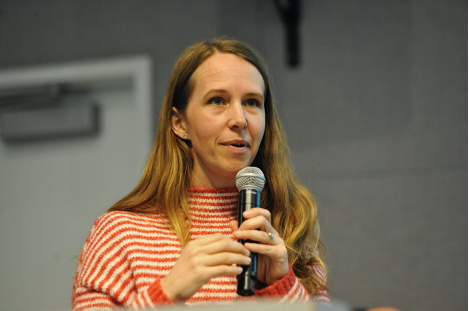
Dr. Sara Lopus in action
Dr. Sara Lopus taught a handful of courses for the first time this year, including SOC 315 (Global Race and Ethnic Relations) and SOC 464 (Professional Development for Sociologists). A demographer at heart, Lopus was particularly excited to create a new course called “Migration” (SOC 321), which she rolled out in an online format this summer. The course is grounded in theory and complemented with empirical data and first-hand accounts of immigrants and their family members. Aligned with Cal Poly’s “Affordable Learning Solutions” initiative, all books and readings for the class were available to students at no cost. Dr. Lopus continued to work on two distinct collaborative research projects. First, she was a supporting author on two publications investigating Kenyan farmers’ responses to climate change. One of these articles, published in the highly regarded journal PLOS ONE, documents community-level commodity sharing across temporal and spatial gradients, which, in turn, correspond to levels of maize production and storage. The other article, published in the journal Climate and Development, investigates farmers’ adoption of mobile phone apps that provide useful and timely agricultural information. Second, Lopus continued to research educational expansion across sub-Saharan Africa and its impacts on demographic behaviors. Together with a colleague at the University of Michigan, she published a paper in the Journal of Marriage and Family, in which they document that as schooling has expanded across Africa, social conventions regarding educational status have played a weakening role in determining who marries whom. This marks the third year that Lopus led a session at Cal Poly’s Inclusion Starts with Me Teach-In to consider how best to attract and support a socioeconomically diverse student body. Although the unanticipated switch to working remotely has presented its share of challenges (not least of which was getting work done amid preschool and kindergarten closures), it has also provided a nice opportunity to make time for local joys, like the comfortable, breezy climate of her makeshift back patio office.

Damage map
Dr. Andrew Fricker is a spatial ecologist with interdisciplinary teaching and research interests. Much of his research focuses on the spatial distribution of plants and animals across numerous ecosystems, from the tropical forests of Kauai and Panama to closer to home in the Sierra Nevada Mountains. This past year he published a few research articles in the journals Ecosphere, and Remote Sensing. He is currently collaborating with faculty across campus on projects including sustainable microgrids, mapping post-wildfire damage using computer vision, mapping agroforestry in the Amazon, mapping eel grass distribution in Morro Bay to studying California's urban forests. He enjoys being the GIS Club Advisor on campus, mentoring young spatial scientists, and helping them find meaningful careers using GIS and Remote Sensing technology. Andrew has been helping students and colleagues navigate the new world of distance learning and instruction and served as a technology coach for the department. He's eagerly gearing up for a couple more quarters of distance learning and is looking forward to returning to the classroom soon.
Damage Map: Using Deep Learning and Google Earth Engine to estimate post-wildfire damage in Paradise, CA after the 2018 Camp Fire. This project was the result of a 'buildathon' project with from the 2019 "Geo4Good" Google conference in collaboration with graduate students at Stanford University.

Dr. Keese and students in a Peruvian
airport on their way to Cusco, Peru.
Dr. James Keese published a paper “LPG Cookstove and Fuel Use in the Cusco Region of Peru” in the International Journal of Sustainable Development Research. This is a co-authored article with two Cal Poly Anthropology-Geography majors, Carolina Guzman Vazquez and Brooke Richter. Dr. Keese also presented the results of this research at the Conference of Latin American Geographers meeting in Antigua, Guatemala. This is the second publication on the topic of stoves, household air pollution, and health; an issue that impacts a third of the world’s population. Both works involved field research in indigenous communities in highland Peru that included Cal Poly students. In 2020, Dr. Keese was also the faculty advisor for the Social Sciences Department’s annual career fair. Additionally, he continued to be the advisor for the Latin American Studies Minor and the Environmental Studies Minor. Dr. Keese was supposed to lead the Cal Poly Global Program in Australia during winter 2021, but it has been moved to summer 2021.
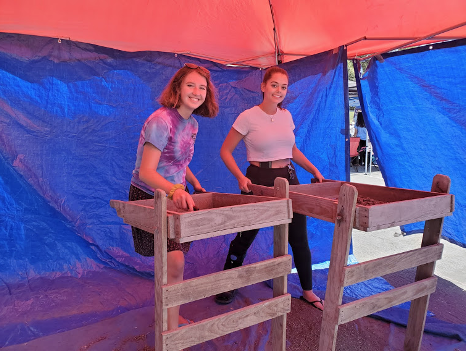
Social Sciences Club students demonstrating
archaeological sifting at the Week of Welcome.
Dr. Liz Johnston continued to lead a local support group and work on the national level with the Association for Frontal Temporal Dementia (AFTD). During the Spring quarter, Dr. Johnston taught a new seminar class: SOC 420 Practical Interviewing and Counseling Skills in Social Work. This class provided students with a wealth of skills needed for entry-level social work positions. Dr. Johnston developed the class material based on her 36 years of counseling experience in a variety of community agencies. Dr. Johnston has two papers submitted for publication. The first paper describes her longitudinal study of 32 older adults who survived critical illness. The second paper presents a new theory of the etiology of paranoia and delusional disorder using insights and case studies from social media and the recent phenomena of gangstalking. Serving as the advisor for the Social Sciences Club she led the effort to provide a booth at the Week of Welcome that included students sifting for archeological artifacts!
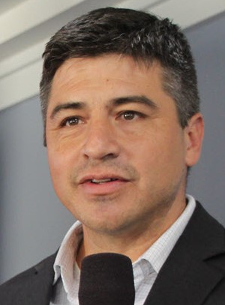
Dr. Ryan Alaniz
Dr. Ryan Alaniz - Along with teaching at Cal Poly, Dr. Alaniz has continued teaching classes at both the county jail and California Men’s Colony (CMC) state prison. He is currently working on creating a B.A. degree in Sociology at the California Men’s Colony with support from the Cal Poly administration, Cuesta College, and the CMC. Once COVID-19 is under control we hope to implement this amazing program. He is working on a book entitled, “Social Problems: Voices of the Incarcerated.” Drawing on inmate life histories as a foundation, the book illustrates how sociology can help us understand a person’s life chances. Dr. Alaniz was also invited to present in Brasilia, Brazil on his research concerning post-disaster resettlements and community development.
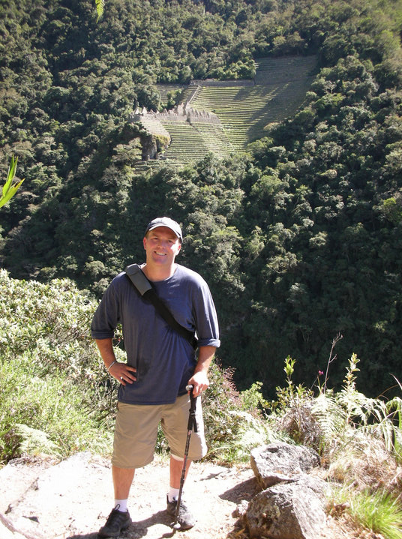
Dr. Timms on the trek
to Machu Picchu, Peru.
Dr. Benjamin Timms became the Chair of the Social Sciences Department in fall 2019 and is working to progress the department in the areas of student success, study abroad, faculty professional development, alumni networking, and fundraising during this pandemic era. In the past year Dr. Timms published a book chapter “Physical Geography: The Human-Environment Context in Latin America and the Caribbean.” In relation to study abroad, it was disappointing but understandable that the spring 2020 study abroad program in Peru was cancelled, but we hope to offer it in the summer of 2021. Relatedly, Dr. Timms presented a paper on a collaborative research project with Dr. Keese and Dr. Fricker, along with students, titled “Reforestation and Local Livelihoods in the Southern Peruvian Andes” at the Conference of Latin Americanist Geographers in Antigua, Guatemala. This project includes our students in field research in ethnographic and geospatial methods with funding coming from our departments Learn By Doing fund, which so many of you have contributed to. We just need the permissions to ‘Learn by Going’!

Dr. Robert Schaeffer
Dr. Robert Schaeffer was the recipient of the Richard K. Simon Award for Outstanding Career Achievement in Scholarship, given by the College of Liberal Arts at Cal Poly in 2020. During his career, Dr. Schaeffer has published a dozen books and two dozen articles on global economic problems, political conflict and social movements. He is currently completing a new book, After Globalization: Crisis and Disintegration, while on sabbatical this fall.

